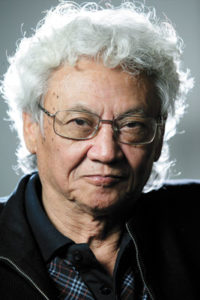
Steven Ng-Sheong Cheung 张五常 is an internationally noted Hong Kong-born economist best known for his work on transaction costs and property rights. Together with his long time friend and mentor Ronald Coase (who was awarded a Nobel Prize in 1991), he is considered a key representative of ‘New Institutional Economics’, a school of thought that focuses on the social and legal underpinnings of economic growth and development. In China, his writings about the Chinese economy were closely followed and seen by many as providing theoretical support for the state’s approach to ‘Reform and Opening Up’. Cheung earned his PhD degree in economics at UCLA in 1967. He undertook postdoctoral research at the University of Chicago from 1967 to 1969. Later he moved to the University of Washington where he taught until 1982. He then returned to Hong Kong to take up a professorship at the University of Hong Kong.
Cheung’s work includes an examination of sharecropping—in which a landowner grants rights to a tenant farmer to work the land in exchange for a share of the crop. Although often seen as an exploitative practice, Cheung argued that it was not necessarily so, and that the practice could lower the costs of monitoring wage contracts (that is, ensuring employees work hard) and increase the economic benefits over a rental contract by sharing the risk between landowner and tenant farmer.
Cheung has referred to his article ‘The Contractual Nature of The Firm’ published in 1983, as his most important work. Drawing on Coase’s influential 1937 article ‘The Nature of the Firm’, Cheung defines a firm as a kind of contractual arrangement: one that can be used to set prices, thereby replacing the market to some extent. Firms can also reduce transaction costs such as the costs resulting from price searching. The work proposes that a government can behave as a firm and can sometimes be more efficient than the market.
In early 1980s China, the benefits of a market economy were still disputed, and private enterprise and capital were seen as serious challenges to the planned economy and the fundamentals of socialism. Even those who accepted or implicitly supported market-oriented reforms still lacked theoretical justification to establishing a market economy. There was a general anxiety about the destructive effects of a market economy on state ownership. Cheung’s ideas provided a theoretical basis for market reforms without rejecting socialism while also offering practical economic guidelines for how such a hybrid system could work: While the government owned property rights of resources such as land, individual business units such as farmers had usage rights. In order words, without tackling the sensitive concept of ‘the socialist public ownership of land’, Cheung’s proposal helped China to adopt a de facto market mechanism to guide the efficient use of resources.
Since the 1990s, the sale or rental of land in China has been a key revenue source at various levels of government. But such practices did not start till the late 1980s. Cheung played a key role in starting this trend. In June 1986, he wrote an article titled ‘Land Sales: kill three birds with one stone’ 出售土地一举三得. In the piece, Cheung encouraged the Chinese government to consider the sale or long-term rental of land as a transitional option to overcome fiscal difficulties. The article used plain language, free of economic theory and jargon, to argue that entrepreneurs owning land bought or leased from the government would use it most efficiently, which in turn would benefit society at large. Facing a major political objection that ‘Chinese land belongs to the nation and cannot be sold’, Cheung argued:
The idea that foreigners or foreign institutions should not own ‘national’ land is too ‘optimistic’. Because the problem is not selling land to foreigners, but getting them to be confident in investing in it. Every government has the right to forbid foreigners from entering, or to kick them out. Every country has this right, what you really need to worry about is scaring the foreign investors away.
至于那些认为外籍人士或外国机构不应占有「国土」的言论,却是过于「乐观」了。因为困难不是卖地给外籍人士,而是要外籍人士有信心投资购买。任何政府都有权禁止非本国籍的人士入境,或驱逐外籍人士出境。国家有这个权,要担心的倒是,一不小心,把投资的外籍人士吓跑了。
Two years later, in 1988, Cheung wrote a follow-up article: ‘Another Milestone – Evaluating Chinese Land Auctions 又是一个里程碑——评中国土地拍卖. Cheung again encouraged the use of market techniques without the state giving up ultimate control:
Land auction in China is not freehold. This is not important. Without freehold, properties can continue to be owned by the state while being used as private land. While we are in the midst of systemic reform, we should not ask for too much nor should we insist on making Chinese property rights the same as those in America.
中国大陆拍卖的土地,并非年期永久的。这不重要。没有永久年期,可以施行私产之实而又能保持土地国有的形象(正如租了房子,房子还是业主的);在体制改革期中,我们难以苛求,不要坚持中国大陆的土地所有权要像美国那样的。
Ronald Coase wrote the foreword to a volume of Cheung’s essays Economic Explanation–Selected Papers Of Steven N.S Cheung and included the following remarks on China:
Included in this volume is a paper Steven Cheung wrote in 1981 (it was published in 1982) with the title, ‘Will China Go Capitalist ?’ His answer, which at the time was regarded as wildly improbable, was that it would. Subsequent events, however, have vindicated Cheung’s prediction. As Steven Cheung says, in a later paper, ‘Whatever the future holds, Deng Xiaoping’s Great Transformation must be regarded as one of the most remarkable chapters in economic history.’
Aside from his economics research, Cheung is a keen amateur photographer. He took the famous photograph of Milton Friedman on the cover of Milton’s 1962 book Capitalism and Freedom. Known for his outspoken style, Cheung is sometimes called an ‘unrestrained scholar’ 狂生. In 2003, Cheung was indicted by a US federal grand jury on a variety of tax related charges pertaining to income from foreign countries. Cheung has not returned to the United States since then, and lives in China where he is a popular blogger and influential thinker.
Additional links
Cheung’s Sina blog: 张五常的博客
Cheung’s Ifeng column
Cosmos Books: Economic Explanation–Selected Papers Of Steven N.S Cheung
http://freakonomics.com/2009/03/23/not-as-authentic-as-it-seems/
The Guardian: Improbable research: the economist who theorised on corruption
Wikipedia: Steven N.S. Cheung



